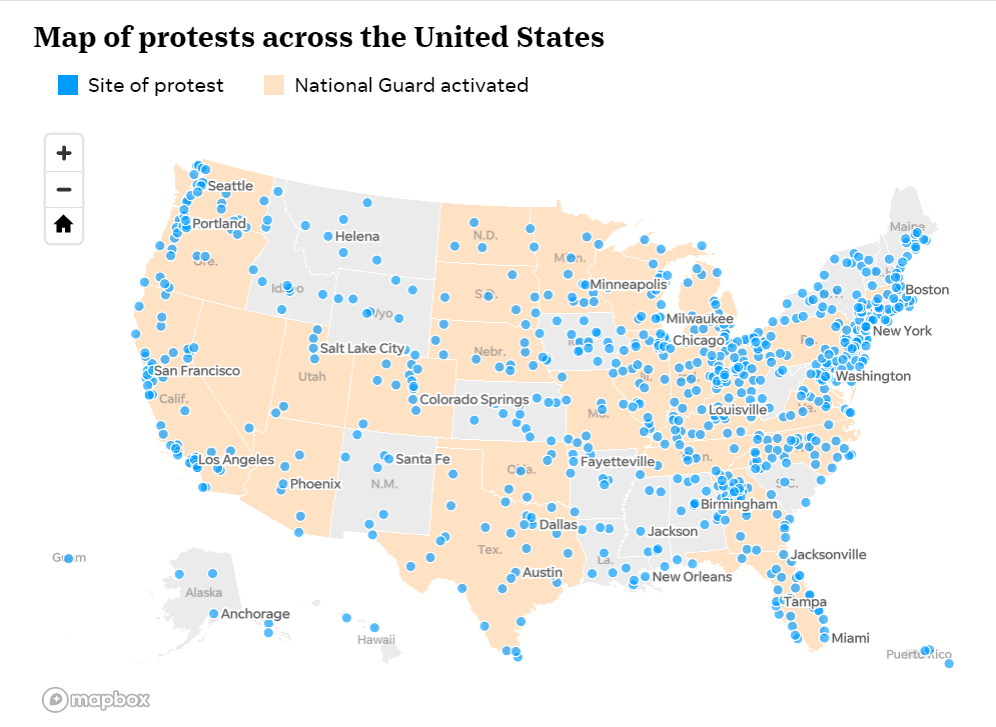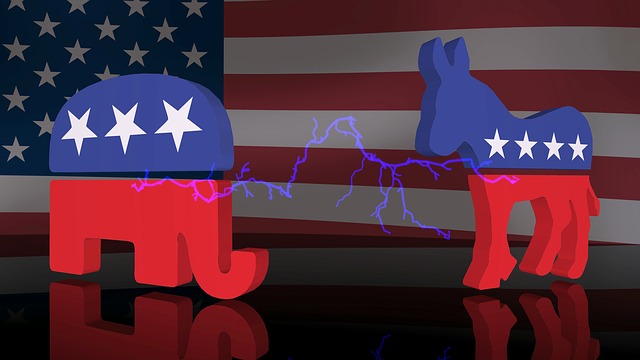|
In a relatively short time, American society has gone from a people trying our best not to spread COVID-19 to a nation in shock over the horrific encounter of Derek Chauvin and George Floyd. Many acknowledge that the situation was brewing beneath the surface for some time, and the scene in Minneapolis simply was the match that ignited what we have now. Regardless of your political views or even your views on systemic racism, the US is not close to a revolution - we are there. Look at some facts. The map below (USA Today) shows cities and towns which have had protests (peaceful or not) and states where the National Guard has been activated. Various places throughout the country are seriously considering dismantling their police forces, with New York City having already diverted funds away from its own NYPD. It does not feel to me like this current crisis will blow over (and I'm not saying it should or shouldn't). Ordinarily, these things, when on this scale, end either with a dictator crushing the rebellion or an overhaul of the way a society is constituted and governed. As a spiritual leader shepherding your congregation during a revolution, here are some reminders and encouragements. There truly has never been a better time to be a pastor, because we have the answers for which so many are genuinely searching.
0 Comments
By now, it should be universally accepted that no one can know precisely when churches will be permitted to reopen their doors to groups of more than 10 people. Critics may criticize for any number of reasons, but this should not be one of them. Also, even with the uniqueness of the COVID-19 situation, any time we deal with uncertainty on this scale, we do well to prepare for as many different scenarios as possible. That said, I am grateful for the work others have done to forecast trends and ideas of where the Church may be post-coronavirus. Having done some of my own research, I'd like to add a few thoughts for church leaders to consider.
The 80% rule (or 70% rule) will probably become the 50% rule (not the 60% rule). You understand your worship space feels full at about 70-80% capacity. Some predict that post-coronavirus this percentage will fall to 60%. Based on researching policies at AMC Theaters and Regal Cinemas and others, 50% appears more likely. This has implications for churches who are designing buildings. If we build what we had previously designed, we will basically lose 60 usable seats if 50% is the new normal. It also has implications for mobile churches. Depending on how your rental agreements are structured, you may have to rent more ballrooms, or more classrooms, and this could drive up your costs. "Public Health Officials" hold the trigger. Not much is said about how we will know when we can resume gatherings, probably because we are at the mercy of the government. The NBA, NHL, and other entities identify "public health officials" as having sole authority about when things reopen. For churches, this is significant, because we appear to have mixed feelings as to our level of willingness to comply with what these officials hand down. Let us factor in the reality that these officials are not just cancelling public worship, but also any gathering of any real size. This is a good talking point for conversations with members. It is essentially out of our hands. People will give toward this but not that. Some are postulating how giving will be affected by COVID-19, just in broad terms of how much it will decrease. Admitting that none of us know anything about the future here for sure, it feels that giving could hold steady, decrease less than expected, or even increase depending on priorities. Layoffs, reduced hours, and basically having less residual income will change things. It feels like people will likely prioritize ministry (difference-making) with immediate fruit, community involvement, personnel (who are making a difference, loving, and serving), missions, and technology over brick-and-mortar, utilities, property upkeep, and so on. This will have budgeting implications. I will save my other thoughts on future trends for a later post. Hope this helps! If you have a sense of where things are going for churches after COVID-19, please feel free to share it in the comments. This post goes a bit deeper than the basic reminder that, as leaders, we need to communicate our expectations and communicate them clearly. You probably have that part down. I find, though, that it is easy to stop there -- and that's not enough. Not only must we communicate what we do want; we must communicate what we don't want.
With the diverse backgrounds of our followers along with different educational attainment, hearing ability, predisposition toward cooperation or not, and so much more, twenty people can hear the exact same presentation and draw at least twenty different conclusions. In fairness, we cannot anticipate every ditch people may stumble into, but investing a few moments to consider this can save you time and headaches down the road. Consider an example. Our church recently added a staff member. We wanted to give that staff member purchasing power, so we asked the bank to generate a credit card for him with "the same information" as the card that I carry as pastor - same billing address, same credit limit, same fact pattern. Months later, we learned that the bank had generated a credit card sharing the credit limit with the card I carry (which is typical procedure we now know). We thought we had clearly communicated that we wanted an additional amount, raising the overall organizational credit limit to accommodate, but the term "same" led all of us into a ditch. Trust me - I could share dozens of other examples, but for a variety of professional reasons, it would be unethical for me to do so. Bottom line: Think through a couple of possible corruptions of your message, and kindly communicate that those corruptions are not what you are after.
An angle that few if any seem to take is to examine the issue from the perspective of overall church unity. It just so happens that I am guiding my church through 1 Corinthians in this modern situational context; so church unity is obviously on the brain. Two questions emerge: (1) Can you have spiritual unity without political unity? and (2) What does preserving spiritual unity look like in such a politically divisive age?
|
AuthorPastor Billy Shaw is a full-time pastor, husband, and father with a passion for helping other pastors. Archives
August 2020
Categories
All
|


 RSS Feed
RSS Feed